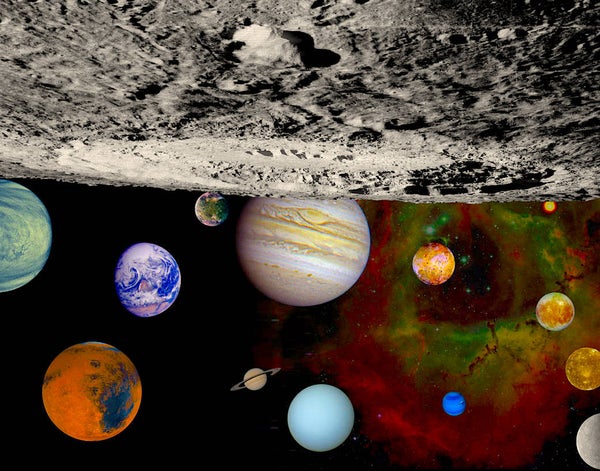This article was published in Scientific American’s former blog network and reflects the views of the author, not necessarily those of Scientific American
It's a seemingly never-ending chore in astronomy these days. Do I call an object a planet, a dwarf planet, a minor planet, or not a planet at all?
And perhaps more importantly, does anyone really care?
Well, apparently some do care. The International Astronomical Union (IAU) cares, and here's what they say a planet is:
On supporting science journalism
If you're enjoying this article, consider supporting our award-winning journalism by subscribing. By purchasing a subscription you are helping to ensure the future of impactful stories about the discoveries and ideas shaping our world today.
"A celestial body that (a) is in orbit around the Sun, (b) has sufficient mass for its self-gravity to overcome rigid body forces so that it assumes a hydrostatic equilibrium (nearly round) shape, and (c) has cleared the neighbourhood around its orbit."
and here's what they say is, erm, not-quite-a-planet:
"A "dwarf planet" is a celestial body that (a) is in orbit around the Sun, (b) has sufficient mass for its self-gravity to overcome rigid body forces so that it assumes a hydrostatic equilibrium (nearly round) shape, (c) has not cleared the neighbourhood around its orbit, and (d) is not a satellite.
All other objects, except satellites, orbiting the Sun shall be referred to collectively as "Small Solar System Bodies". "
Wonderful. Except it's not very wonderful. Pick apart the details and to be honest it's a hot mess (I know, I'm being rude, and I'm expecting the IAU ninjas to start leaping through the window any moment). It's like one of those much-lambasted rules foisted on the world by multinational agreements, or the will of a lunatic dictator - 'if you stand on this land you shall all be called tax-paying citizens, and that includes the herd of goats over there'.
But it is of course useful to be able to talk about cosmic objects in a reasonably consistent way. Ideally any nomenclature transmits some quantitative information and allows for efficient communication - without the need for extensive translation. It also helps if you don't need to reinvent the rules for every new instance. Like, oh I don't know, all the exoplanets for example.
Here's an uncalled for, and likely unwanted suggestion.
Let's call everything a planet.
Ok, maybe not everything. But what if we called all distinguishable cosmic condensations of normal matter smaller than the mass limit of 13 Jupiter masses (roughly where sporadic internal nuclear fusion starts happening) planets? And I mean all. Way down to a grain of interstellar dust that could be 0.1 microns across (a tenth of a millionth of a meter).
Sounds crazy. Except I think that various problems start to disappear when we use a scheme like this.
It's still reasonable to use the mass of the Earth as the fundamental unit (not size, because mass directly relates to the amount of matter present), and that means the following:
A giant planet like Jupiter would be a hecto-planet (a few hundred times the mass of Earth).
The most massive exoplanets would be kilo-planets (few thousand times the mass of Earth).
Neptune, Uranus and Saturn (just) would be deca-planets.
Venus and Mars would, strictly speaking, be deci-planets, and Mercury and our Moon would be centi-planets - but of course we can call all of them 'planets' if we want to. The rule is to use the most efficient term in any given context. I'm not really going to call our Moon a planet, but I could - it's a centi-planet natural satellite.
Pluto is a planet, happily, but more strictly a milli-planet.
Small asteroids might be (depending on their precise mass) atto- or zepto-planets. And by the time we get down to interstellar dust grains we're basically talking about sub-yocto-planets.
Naturally, using these terms wouldn't be our first preference in conversation. Just like the way we talk about biological entities, the context allows us to simplify. I can talk about giraffes and we all understand, I don't generally talk about Giraffa camelopardalis or Giraffa tippelskirchi or any of the other of the 11 or so sub-species. Nor do I refer to them as tall, African, even-toed ungulate mammals, even though that would identify them quite properly.
If I discuss Pluto I can call it a planet. I can qualify that statement by calling Pluto a trans-Neptunian planet, or a trans-Neptunian milli-planet, or a planet that is part of a milli- and micro-planet binary. Actually using the term milli-planet also conveys some key information: Wow! Pluto is teeny!
I'm unlikely to talk about a grain of interplanetary dust as a planet, but strictly speaking its 'scientific name' would be a sub-yocto-planet of some specific composition or location.
This idea does, admittedly, play a little fast and loose with the original term 'planet', which we all know comes from the ancient Greek description of wandering stars, or just wanderers. But hey, all of these condensations of matter do still wander relative to the stars from our perspective. Relegating orbital properties to a secondary status is quite reasonable because they're also subject to change on long timescales - orbits need not be original or static. This proposal also dodges the question of whether an object is 'nearly round' (nice one IAU) and in hydrostatic equilibrium because who cares - it's just a planet.
And that, when all is said and done, is all that really matters.
